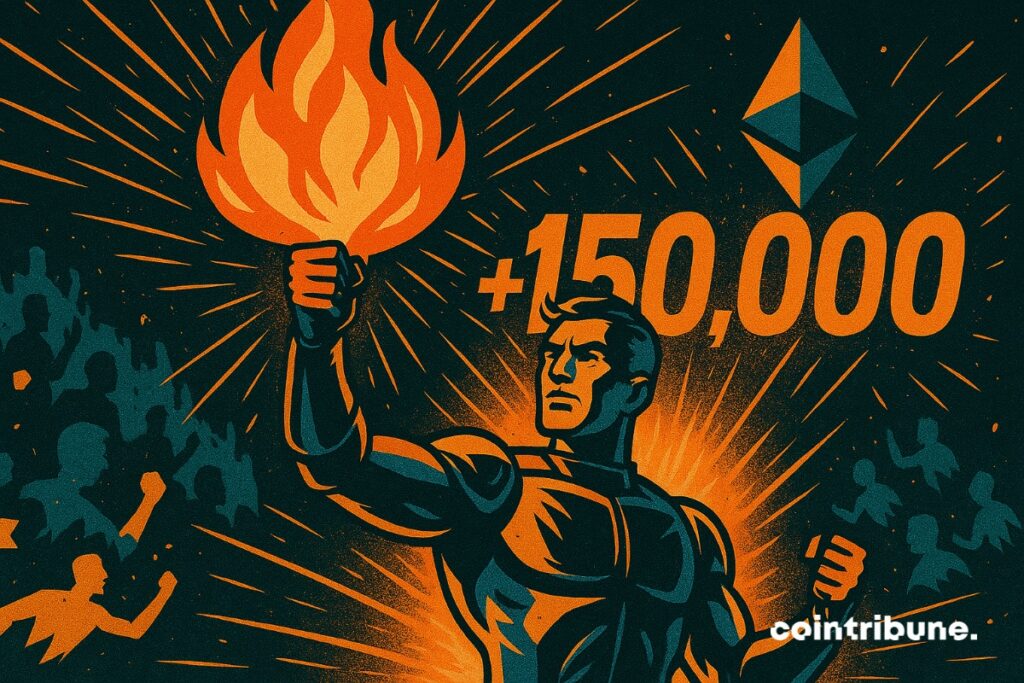Ethereum: Towards A Gradual Doubling Of The Gas Limit Thanks To Validators
An important movement is shaking the Ethereum community: more than 150,000 validators, nearly 15% of the network, are requesting to increase the gas limit per block. This initiative could almost double the crypto transaction processing capacity on layer 1, raising both hopes and concerns about the technical and operational future of the blockchain.

In Brief
- More than 150,000 Ethereum validators support raising the gas limit to 60 million.
- This increase adjusts automatically without a hard fork, but it could weaken network stability.
- Ethereum will need to find a balance between scalability, decentralization, and security.
Ethereum: a massive signal from validators to double the gas limit
For several years, Ethereum’s gas limit has controlled the maximum volume of crypto transactions that can be included in a block. Currently set at 36 million units, it is the key to the native scalability of the blockchain. However, a growing coalition of validators are beginning to signal their support to raise this gas limit to 60 million, a leap of nearly 67%.
This collective push reflects a clear desire to increase transaction throughput, but also to meet the growing demand from Ethereum users. More than a number, this signal embodies a tangible tension between the need to streamline blockchain usage and the necessary caution in the face of technical constraints.
How the gas limit adjusts automatically without a hard fork
The method of adjusting this limit is as innovative as its scale. Unlike a conventional update requiring a hard fork, the gas limit increase happens automatically when more than 50% of validators agree. This feature eliminates the risk of splitting the crypto network and ensures a smooth transition.
Crypto validators can modify their node configurations to support the increase, making this process decentralized and agile. This approach illustrates a significant advancement in Ethereum’s technical governance, where the majority of participants can drive a crucial change without disruption.
What impact does the gas limit increase have on Ethereum network performance?
On paper, this gas limit increase promises to relieve network congestion and significantly increase the number of crypto transactions processed per second. However, this progress could negatively impact the hardware load on validator nodes.
More gas per block means greater resource demands, notably in CPU, memory, and bandwidth. This additional pressure could then:
- make node maintenance more expensive and complex;
- increase the risk of centralization or failure.
In other words, the quest for efficiency could paradoxically weaken Ethereum’s very robustness and potentially the price of ETH.
Review of the progressive gas limit increases and future challenges
This is not the first time Ethereum has raised its gas limit. Since 2021, it has increased from 15 million to 30 million. Then to 36 million in February 2025, after approval by 52% of validators. Each milestone accompanied a blockchain performance boost while presenting new challenges.
The proposal to raise the gas limit to 60 million marks a crucial step. Ethereum must now balance improving the user experience while preserving decentralization and stability. This major evolution raises a dilemma: how to reconcile scalability and security, innovation and stability? Will these technical efforts be enough to counter the prediction of Charles Hoskinson, who predicts the end of Ethereum within 15 years?
Maximize your Cointribune experience with our "Read to Earn" program! For every article you read, earn points and access exclusive rewards. Sign up now and start earning benefits.
The world is evolving and adaptation is the best weapon to survive in this undulating universe. Originally a crypto community manager, I am interested in anything that is directly or indirectly related to blockchain and its derivatives. To share my experience and promote a field that I am passionate about, nothing is better than writing informative and relaxed articles.
The views, thoughts, and opinions expressed in this article belong solely to the author, and should not be taken as investment advice. Do your own research before taking any investment decisions.